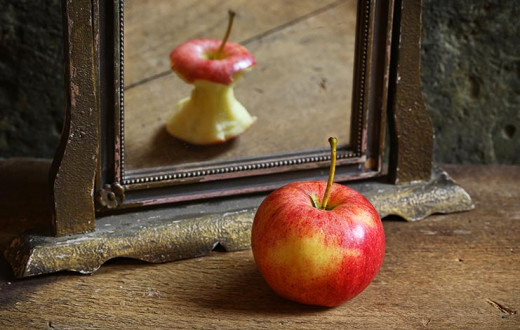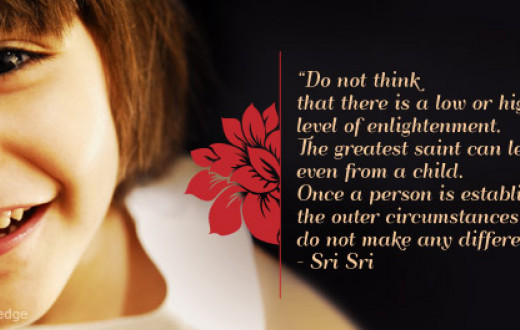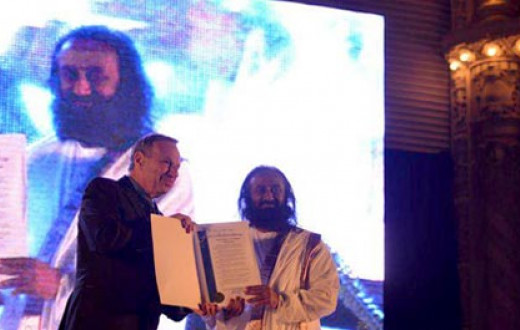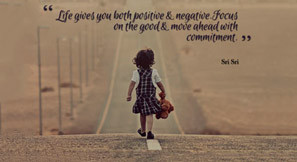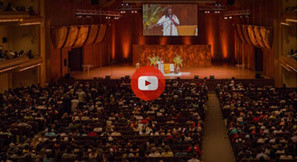Bangalore, India
Below is a transcript of what Gurudev Sri Sri Ravi Shankar said at the Bangalore Literary Festival. The festival was designed to bring the focus onto the literary heritage of the city and to transform Bangalore into the hub of Indian Literature. The event honoured the creative spirit of the city while providing a common platform for interaction between the finest literary brains in the world of literature; both within and outside India.

It is nice to be here with you in this literary festival.
Literature and spirituality have a long relationship. If spirituality is alive today on this planet, it is because of literature. Most of the literature that is prevalent, read and practiced, at least in this country, has some spiritual connection.
Again, what is spirituality? Is it something out there, or is it something practical? I would say that anything that uplifts the spirit is spirituality. In the sense that, every literature that uplifts you, brings a smile on your face, gives you that much needed relaxation, or some confidence when things are crumbling, or some faith when all is shaken and lacking, I would call it spirituality.
In fact, I would say that all poems come from that space which I call spiritual. It all comes from an inner (spiritual) plane, or the intuitive awareness.
The book, An Intimate Note to the Sincere Seeker, is an outcome of dialogues that I would have with a group of youth, every Wednesday, for seven years. We would ask each other some questions, discuss some topics, churn an intellectual debate, and with whatever came up, we would make a knowledge sheet from it.
There is a saying in Sanskrit, ‘Vade vade jayate tattvabodhah’, every debate brings forth an understanding of principles. When we debate on our experiences, something very beautiful comes out of it. So, debate is definitely a part of literature, and spirituality.
A deep sense of fulfillment and satisfaction is the sign of a spiritual experience.
In the Art of Living, we take the help of the breath (since the breath and mind are closely linked) to bring that much needed relaxation for the body and mind. This is helpful for people who face the writer’s block. So if you are a writer, when you sit to write, do some breathing exercises and relax. You will see that suddenly the Gyana Nadi, as it is called in Yogic Science, (i.e., a particular channel of energy), opens up. Then you are able to write, and the writer’s block just vanishes.
So, spirituality is very useful for writers to be innovative, intuitive and creative.
A few minutes of deep silence can enhance our ability to express ourselves much better.
Can you observe what is happening to you right now? Can you read in between the words? Can you feel something is settling down in the mind?
The rat race that is happening with our thoughts, when it slows down, something wonderful starts happening within ourselves.
Writers usually prefer to be with nature. Do you know what really happens when you are with nature; be it at the seaside, or the mountainside, or in the garden? Something slows down within. That is when your entropy goes down, and creativity comes up.
This is exactly how the writer’s block opens up for many people when they go on a retreat, or go to some quiet place.
When you sit and write something early in the morning, you feel much better because of the atmosphere or the ambience that is around you. We can create this ambience wherever we are, and at our own will, we don’t have to be somewhere. We can calm this mind just by attending to our breath.
When I started writing in 1972, I was 16 years old. One of my very close friend’s fathers, was a very famous writer called Gopal Krishna Adiga, and many times, we would just sit and chat with him. We were surrounded by people of eminence who inspired us to do something.; I would tell them that after reading their books or poems, I couldn’t write anything because whatever I felt, it was already written!
So, for young and budding writers, I would suggest that you don’t read many big books. Instead; you go and watch some paintings.
Painters should not go and see other’s paintings. I would suggest that they read books, so they can paint well.
Sometimes you feel someone has written so well that you can’t write better than them. Whatever it is that you want to say, has already been said and done. This is exactly the feeling I got when I used to read some of the works of Krishna, Adiga's, or Dr. D.V. Gundappa’s Mankuthimmana Kagga. They have written about things that many of us have experienced.
Literature plays such an important role in instilling common sense in people. It can also create prejudice and wrong notions, and it can also make someone’s mind very narrow. We have seen what has happened in China and many other parts of the world. It is all through literature that a set of ideology was imposed, and a large population has suffered; millions of people have died by adhering to those parts.
Chhattisgarh, a place I am to visit today, is an area afflicted by Naxalite activities. It also has its own literature. The Naxalites believe so strongly in it that they quote Napoleon, and say, ‘Violence is the way!’
I told them that Napoleon didn’t ask anyone to vote for him! He went and acquired the kingdom with his strength; so we have to work on our own strength.
This sort of brain-washing or infusing of an ideology towards violence has happened on the planet. On the contrary, the same has happened with peace also; the writings of Mahatma Gandhi, Martin Luther King and many others are based on peace, perseverance, patience and spreading love, which is far more essential today.
Literature can lead people astray from peace, and it can also bring them peace. It can create a sense of anger and frustration, or a sense of belongingness and love. We all know this.; I am not saying it should be one or the other.
Life is very complex and it can be complete only when it has all the aspects. Any literature should have a little bit of sarcasm, skepticism, thrill, something for people to ponder on rather than give them everything on a platter.
People should come up with their own ideas. Individuality should grow in literature. It is my opinion that literature should lead people to individuality rather than mass hysteria or an idea. It should allow people to think for themselves, to come up with creativity, to come up with their own ideas, and at the same time, honor the universal human values.
To the sincere seekers, I would like to give them a note, seek the highest!
Seek life beyond what it appears to be, beyond the perception of our five senses. Look into the mystical aspect of life, which is prevalent in every one of us. You don’t have to go somewhere, you can simply see life in a bigger context.
Ask yourself, who am I? What am I doing? What do I want? What is this universe about? What is all this about? This enquiry within you makes you a seeker. Every literate person, I feel, should be a seeker. Seeking should not end.
Seeking begins in life at a very early age. A three year old child starts asking questions, and this should continue our whole life, where we want to know, where we want to see what the truth is, and what life is; to understand this complex idea called human life; to understand the minds of others, and one’s own mind!
Putting attention on these faculties that we have been bestowed with - the mind, intellect, memory, ego, and something beyond, from where thoughts come will make our life so much richer. Prejudice should be done away with. An open minded approach to any field, I feel, is real common sense.
Why do you have to choose between these two? Why don’t you do both? Write for commercial purposes, and write something that is very immortal, to go for times to come.
(Ans: But Gurudev, I have an identity. Either I hold on to my identity, or have two identities.)
You can have more than one identity. Why do you want to be stuck with one identity? You can do this and that. I feel there is no conflict.
Духовность является необходимостью для нашей страны. Реальность в том, что она доступна только богатым, вернее, тем, кто может себе ее позволить. Что должно быть сделано, чтобы каждый человек, который, не может себе ее позволить в финансовом отношении, получил бы свой духовный опыт?
Когда бедняки принимают духовность, они действительно принимают ее искренне. Они бросают вредные привычки, алкоголь и наркотики.
Мы также проводим программы в тюрьмах. Поэтому я не согласен, что духовность только для элиты или богатых людей, она для всех. Однако если что-то дается бесплатно, то богатые это не воспринимают. Богатые приходят, если они должны что-то заплатить - тогда они думают, что из этого можно что-то получить. Это психология богатых людей.
Вы должны помнить, что люди очень разные. Мы находимся не в гомогенном обществе, мы находимся в очень гетерогенном, разношерстном обществе. Даже отдельно взятый человек не бывает одним и тем же все время: его настроения меняются, его чувства меняются. Например, иногда человек хочет послушать резкую, немелодичную музыку, а в другое время этот человек будет слушать музыку, наполненную тоской и меланхолией.
Настроения людей меняются; когда меняется настроение, также меняется и тип литературного произведения, которое они выбирают. Люди разные, и они получают удовольствие от разных вещей.
В Индии в древние времена существовала концепция navarasa(навараса),девяти настроений. Говорится, что литературное произведение считается завершенным только тогда, когда оно содержит в себе все эти девять настроений - например, злость, задор, что-то вроде отчаяния, печаль... Все эти девять настроений привлекают людей в разное время. Некоторым очень нравится юмор. Другие не хотят постоянно читать что-то смешное, им хотелось бы читать произведения, как вы заметили, которые затрагивают сердце, или заставляют поплакать или поволноваться. Вы должны ориентироваться на все слои общества и умело выражать то, что чувствуете.
Вы не можете заставить себя все время быть смешным, вы не можете заставить себя писать любовный роман или песню о любви. Если это не идет изнутри, тогда, я думаю, ваши усилия могут оказаться не достаточно плодотворными.
Литература не может быть только эмоциональной. Если в ней одни лишь сантименты, люди не захотят это читать. Чтение – это интеллектуальная работа, оно не должно быть слишком сухим, как чтение технической литературы, тогда это будет слишком скучно. Литературное произведение должно быть комбинацией небольшого количества эмоций и остроты интеллекта – подобно современной поэзии, в которой есть интеллектуальный аспект. Она стимулирует ваш интеллект и зажигает и подпитывает столь необходимые эмоции. Я думаю, все успешные литературные произведения обладают этими двумя аспектами. </p>
Мелочные желания должны перерасти в большие желания, а желание чего-то большого не приносит вам напряжения. Только мелочи заставляют вас напрягаться.
На санскрите есть такая пословица: ‘Naalpesukhamastiyovaibhumaatatsukham’. Ум всегда стремится к чему-то большему - большей радости, большему блаженству. Это его природа, и вы не можете ее избежать. Уму хочется обладать чем-то бóльшим, и духовность дает вам эту бóльшую радость, бóльшее счастье.
Один вид счастья – это счастье от приобретения; как и дети, мы все можем его испытывать. Однако взрослый человек испытывает счастье отдавая - как, например, мать. Она с удовольствием готовит на всю семью, но когда она остается одна, она не готовит себе пять или десять блюд на обед. Она никогда так не делает. Она выпьет чашку чая или кофе и чем-нибудь перекусит. Итак, существует счастье в том, чтобы отдавать. Великие писатели, и вообще авторы испытывают эту радость: «я дал что-то обществу, я написал что-то». В этом есть радость, так что стремитесь к этому.
Духовность – это погружение в источник мыслей и эмоций, нахождение безмятежного пространства внутри себя.Тогда вы обнаруживаете то, из чего создано все.
Если вы квантовый физик, я вам точно говорю, что тогда вы также духовны. Вы не можете разделить эти два понятия, потому что квантовые физики говорят то же самое – что вселенная создана из одного вещества. Они понимают это, а те, кто занимаются духовностью, говорят это, основываясь на собственном опыте: “Да, чем бы я не являлся, из этого созданы все. Мы все едины. Весь мир является единым организмом”.
Это понимание дает безграничную уверенность, покой и безусловную любовь. В каждом есть немного духовности. Нет ни одного человека на этой планете, кто был бы лишен духовности
Is there a way to become a spiritual guide? I don’t think so, and I don’t know. I don’t know if there is a way at all! You may ask me how I became a spiritual guide. I just know that whatever I learnt, I kept sharing with other people, that's all!
One thing I have maintained is, I am not going to speak about anything that has not come in the purview of my experience. So whatever was there, I kept sharing with people.
In the same way, each and every one of you is a spiritual teacher; consciously or unconsciously, you are teaching everyone. You are teaching by your good deeds, and you are also teaching others through your mistakes. When you make a mistake, not only do you learn from your mistake but a whole lot of people around you are learning from your mistake. So, being a spiritual teacher is unavoidable for you on this planet! You don’t have to change your dress and put on a dhoti-kurta, or a spiritual dress, or have longer hair; this is not necessary! If you are able to smile, genuinely; if you are able to feel love for everyone, then not only you, but others will also feel the same for you. It just makes your life very rich. It opens up a door to another dimension. If you are a meditator, you know it and will agree with me as well.
Hold on to your dreams, one day, it will come true.
I was also a student in this same city. I thought I should go around the world and unite people of all countries as one family. People thought I was crazy! When you have some vision like that, people definitely think that you have lost it! However, if you hold onto your dream, one day it will come true.



















